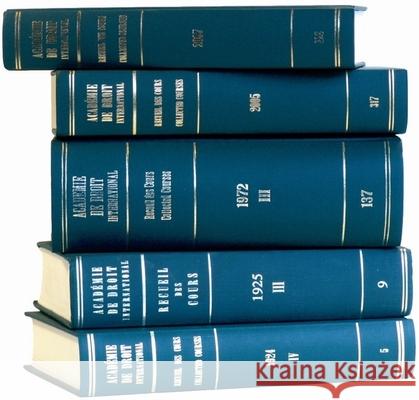Recueil Des Cours, Collected Courses, Tome/Volume 371 » książka
Recueil Des Cours, Collected Courses, Tome/Volume 371
ISBN-13: 9789004289369 / Francuski / Twarda / 2015
La methode de la reconnaissance est-elle l'avenir du droit international prive ?, par P. Lagarde; Democracy and International Law, by H. Charlesworth; These lectures consider the way that international law defines and shapes ideas of democracy. This process is most obvious today in the context of post-conflict societies, but it also has a broader significance, affecting the whole fabric of international law. While there is an extensive literature on democracy in philosophy, political theory and international relations, there has been much less attention paid to the concept by international lawyers. The term is typically invoked as a self-evident good, and there has been little sustained analysis of the many meanings of democracy deployed in international law. The lectures argue that international lawyers have generally taken democracy to have a fixed form, associated with specific institutional practices and structures, and have been slow to recognize democratic forms outside these parameters. In other words, the discipline of international law has lost sight of why we might want democracy, assuming that it can be realized by a set of institutions. L'exception d'ordre public et la regularite substantielle internationale de la loi etrangere par Pascal de Vareilles-Sommieres Si l'exception d'ordre public fait incontestablement partie des mecanismes les plus classiques du droit des conflits de lois, l'incertitude qu'on observe aujourd'hui encore sur sa place aussi bien que sur les conditions de son fonctionnement dans le raisonnement conflictualiste est le signe que sa veritable nature n'a pas ete, pour lors, correctement elucidee. Le present cours s'attache a demontrer qu'avec l'exception d'ordre public, le droit des conflits de lois accueille en son sein un mecanisme qui ressortit au droit et a la theorie de la regularite substantielle internationale des normes, et qui concerne plus particulierement cette norme precise qu'est la loi etrangere, lorsque son application dans un Etat est envisagee dans un cas donne du fait de sa designation par la regle de conflit. Il resulte de cette analyse une clarification du fonctionnement de l'exception d'ordre public, a la fois au plan des standards de l'ordre public a l'oeuvre dans ce mecanisme (distinction par rapport a l'ordre public interne et aux lois de police) et au plan du controle de la conformite de la loi etrangere par rapport a ces standards (revelation d'une exception d'inopposabilite de la loi etrangere, allocation de l'effet positif habituellement impute a l'exception, au mecanisme plus general de la vocation subsidiaire de la loi du for). Significance of the History of the Law of Nations in Europe and East Asia by Masaharu Yanagihara It was a commonly held view in the nineteenth century that international law was a concept developed only in Europe. This view has been widely criticized and now the idea is generally accepted that there are various types of "international law" in various periods and regions, even if "rudimentary" as seen from a contemporary viewpoint. After analysing the "reception" process of modern European international law in East Asia (China, Korea and Japan), this article focuses on the "reception" in Japan of two specific institutions, namely territory and international adjudication, both of which are particularly important concepts in modern European international law. The purpose of this article is not to put forward immediate and practical solutions to current issues, but to show the importance of historical investigations, which will contribute to tackling these important issues from various points of view in order to achieve a real breakthrough in our understanding.











